For many seniors, the phone isn’t just a device-it’s a lifeline.
It’s how they check in with family, call the doctor, or reach 911 in an emergency. But as technology changes, the choice between a landline and a Voice over Internet Protocol (VoIP) system can feel overwhelming. One keeps working when the power goes out. The other blocks scam calls before they even ring. Which one is right for you-or for a parent, grandparent, or loved one?
Landlines: Simple, Reliable, and Always On
Landlines have been around since the 1870s, and for good reason. They don’t need the internet. They don’t need Wi-Fi. They don’t need a router. You just plug the phone into the wall jack, and it works. Even during a power outage, most landlines keep running for 2 to 4 hours because they get power from the phone company’s central office.
That’s why 67% of seniors over 65 still keep a landline-mostly for 911 reliability, according to AARP’s 2024 survey. When you dial 911 from a landline, emergency responders instantly know your exact address. No guessing. No delays. That’s not always true with VoIP.
Physical phones like the Panasonic KX-TGE233B are designed with seniors in mind: big buttons (0.8 inches wide), loud ringers (80 decibels), and clear, easy-to-read numbers. No apps. No passwords. No setup. Just pick up and talk.
Voice over Internet Protocol (VoIP): Smarter, But More Complex
Voice over Internet Protocol, or VoIP, turns your voice into digital signals that travel over your internet connection. It’s not new-first launched in 1995-but it’s become a serious option for seniors who want more control over their calls.
One big advantage? Scam call blocking. VoIP services like Callcentric and Ooma use smart filters that stop 98.7% of robocalls before they reach you. That’s huge. The Federal Trade Commission says over half of seniors targeted by phone scams lose money-sometimes thousands of dollars. With VoIP, you can block unknown numbers, set up “allow only” lists, or even have the system answer and play a message to suspicious callers.
Hardware like the Ooma Telo phone base makes it easier: 1.2-inch buttons, 90-decibel ringer, and full hearing aid compatibility. Some models even let you program just three numbers-perfect for seniors with memory issues. The phone only calls those three people. No confusion. No wrong numbers.
Power Outages: The Hidden Risk of VoIP
This is where landlines win hands down.
If the power goes out, your Wi-Fi router dies. Your modem shuts down. And if you’re using VoIP, your phone goes silent-even if your phone itself has a battery. That’s a serious problem in winter storms, summer heatwaves, or wildfires.
Landlines, on the other hand, keep working. They’re powered by the phone line itself. You don’t need to plug them in. They just work.
VoIP users can add backup batteries. Ooma’s Linx device, for example, gives you up to 6.5 hours of talk time during an outage. But that’s an extra cost-and an extra thing to remember to charge. Most seniors don’t know they need it, and even fewer keep it plugged in.
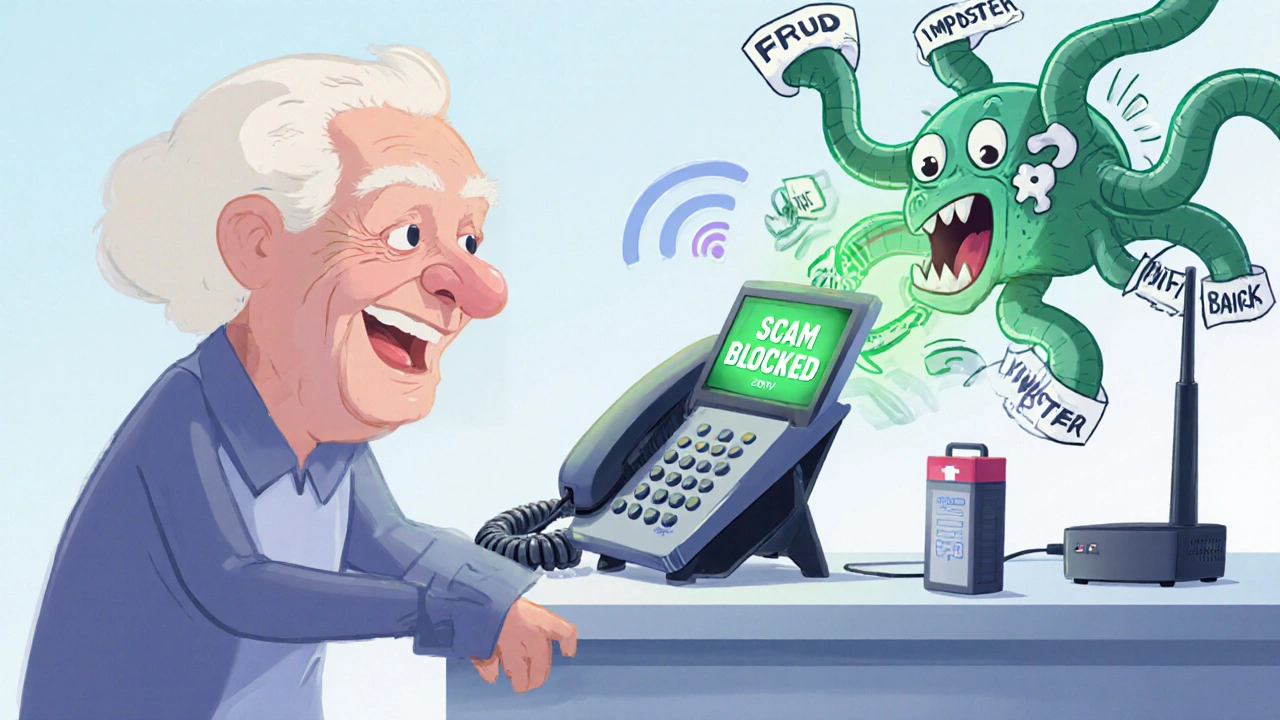
911 Calls: A Life-or-Death Difference
Emergency calls are where the gap between landlines and VoIP becomes dangerous.
Landlines automatically send your address to the local emergency center. No typing. No setting. No mistakes. The system knows exactly where you are.
VoIP? Not so much. Even with FCC rules like Kari’s Law and RAY BAUM’S Act, which require accurate location data, only 89% of VoIP 911 calls connect correctly. That’s 11 out of every 100 calls that might not get the right address. In a medical emergency, that delay can cost precious minutes.
Some VoIP providers now offer location updates via smartphone apps-but that means you have to carry your phone, remember to turn on GPS, and have a working internet connection. For many seniors, that’s too many steps.
Cost: VoIP Saves Money-If You Can Set It Up
Landlines cost about $30 a month for unlimited local calls from AT&T or CenturyLink. That’s steady. Predictable.
VoIP? You can pay as little as $7.46 a month with Voiply. That’s over $380 saved a year. Some services, like Consumer Cellular’s Wireless Home Phone, run $20-$50 a month and use cellular networks instead of Wi-Fi-so they don’t rely on your home internet.
But here’s the catch: setting up VoIP takes time. According to a 2025 study by SeniorLiving.org, the average senior needs 2.7 hours of help to get VoIP working. That’s not just plugging in a phone. It’s connecting to a router, checking internet speed (needs at least 100 kbps), testing call quality, and learning how to manage settings.
Landline? Plug it in. Done. 18 minutes max.
Support and Setup: The Real Barrier
Most seniors don’t struggle with the phone itself. They struggle with the support.
Consumer Cellular, a top choice for seniors, offers 24/7 help with average hold times of 47 seconds. Their reps know how to talk to older adults-no jargon, no rush.
VoIP providers? Average hold times are 14.3 minutes. Many seniors report being talked to like they’re tech experts: “Check your DHCP settings,” “Reboot your gateway,” “Enable QoS.” That’s not helpful. That’s frustrating.
Documentation is worse. Landline manuals average 4.2 out of 5 in clarity on SeniorAdvice.com. VoIP guides? Just 2.8 out of 5. Too many assume you already know how Wi-Fi works.
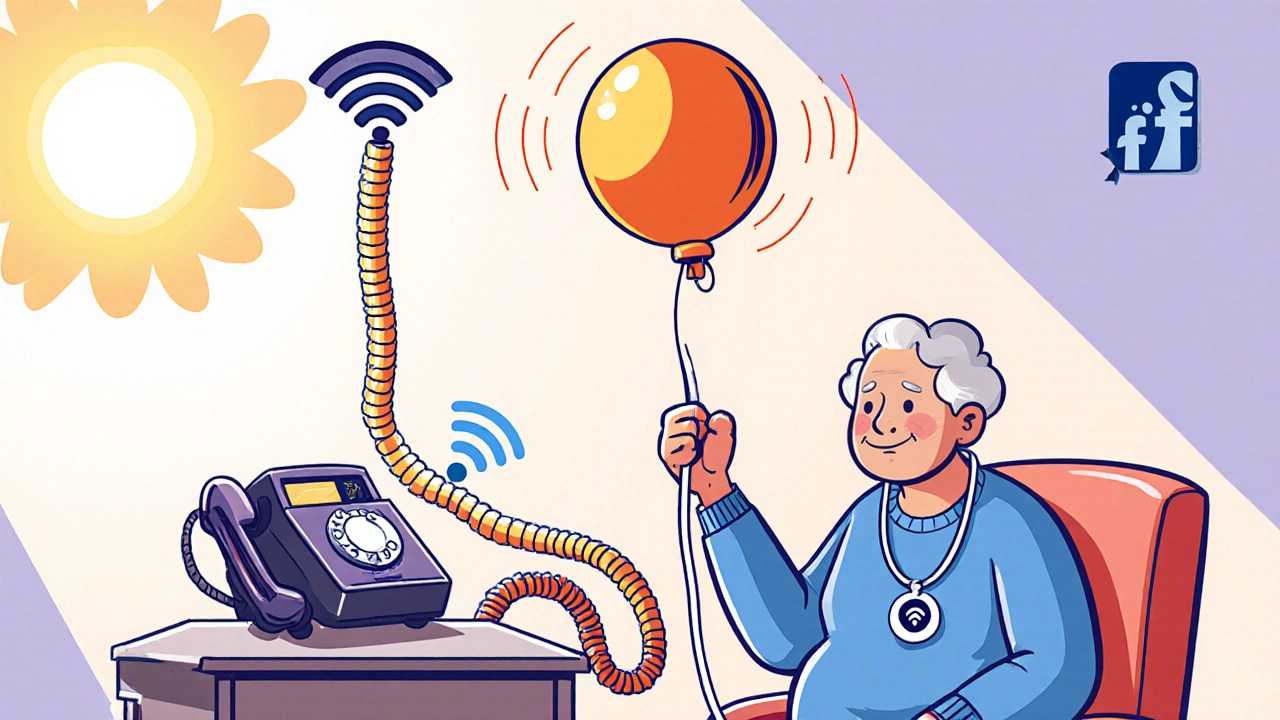
Who Should Stick With a Landline?
- Seniors over 80, especially those living alone
- People with limited mobility or memory issues
- Those in areas with unreliable internet or frequent power outages
- Anyone who values simplicity over features
For these users, the peace of mind from a phone that just works-no setup, no internet, no batteries-is priceless.
Who Might Benefit from VoIP?
- Seniors 65-75 who are tech-curious and have reliable internet
- Those who get dozens of scam calls a week
- People who want to use a smartphone-style interface with big buttons
- Those with caregivers who can help with setup and monitoring
VoIP’s scam-blocking, call logs, and remote management features can be life-changing-if the setup isn’t a nightmare.
Hybrid Solutions Are the Future
The best of both worlds is starting to appear.
Ooma’s Senior Safety Bundle, launched in January 2025, combines a landline-style phone with a wearable sensor. If the user falls, the device automatically alerts family members and calls 911. It works over Wi-Fi but has a backup battery.
Community Phone is upgrading old copper lines to fiber-keeping the same phone jack, same sound, same reliability-but now it’s running on modern infrastructure. That means better call quality and lower maintenance costs.
And the FCC is stepping in. Starting in 2025, $1.2 billion a year will go toward making phone service easier for seniors-funding better support lines, simpler devices, and training for customer service reps.
Final Decision: What Matters Most?
Ask yourself three questions:
- Does the person need the phone to work during a power outage? If yes, choose landline.
- Are they getting dozens of scam calls? If yes, VoIP’s filtering might be worth the setup.
- Can someone help them install and troubleshoot? If no, stick with landline.
There’s no one-size-fits-all answer. But for many seniors, especially those over 80, the old-fashioned landline still offers the safest, simplest, most reliable connection to the world.
For younger seniors who are comfortable with tech, VoIP offers powerful tools to fight scams and stay connected-without the noise.
The future isn’t landline or VoIP. It’s choosing the right tool for the person-and making sure they never feel alone because their phone didn’t work when they needed it most.
Do landlines still work during a power outage?
Yes, most traditional landlines continue working during power outages because they receive power directly from the phone company’s network. This allows them to operate for 2 to 4 hours without electricity. VoIP phones, however, require power for your router and modem-and will not work unless you have a backup battery system.
Can VoIP block scam calls better than landlines?
Yes, VoIP services like Ooma and Callcentric use advanced spam filters that block up to 98.7% of robocalls before they ring. Landlines have no built-in blocking-any call comes through. Seniors on VoIP often report zero unwanted calls after setup, while landline users may still receive dozens daily.
Is 911 more reliable with a landline?
Yes. Landlines automatically send your exact address to emergency responders when you dial 911. With VoIP, your location must be manually registered and updated, and 11% of VoIP 911 calls fail to connect to the right emergency center, according to the National Emergency Number Association. In emergencies, that delay can be life-threatening.
How much does a senior-friendly phone cost per month?
Traditional landlines cost about $29.99/month for unlimited local calls (AT&T). VoIP services can cost as low as $7.46/month (Voiply) or $20-$50/month for cellular-based options like Consumer Cellular. The main difference is setup: VoIP requires internet, and may need extra equipment like a backup battery.
What’s the easiest phone for seniors to use?
The Panasonic KX-TGE233B landline is widely rated as the easiest: large buttons, loud ringer, no apps, no Wi-Fi. For VoIP, the Ooma Telo with its 1.2-inch buttons and hearing aid compatibility is the top choice-but it requires internet setup. Simplicity wins for most seniors over 80.
Can I keep my landline if my internet goes out?
Yes, if you have a traditional copper landline, your phone will keep working even if your internet goes out. VoIP phones depend entirely on your internet connection. If your router loses power or your broadband fails, your VoIP phone won’t work unless you have a backup battery or cellular alternative.
Are there any government programs to help seniors with phone service?
Yes. Starting in 2025, the FCC is allocating $1.2 billion annually through 2029 to improve telecommunications access for seniors. This includes funding for simpler devices, senior-friendly customer support, and subsidies for low-income households. Some states also offer discounts on landline or cellular plans for seniors.

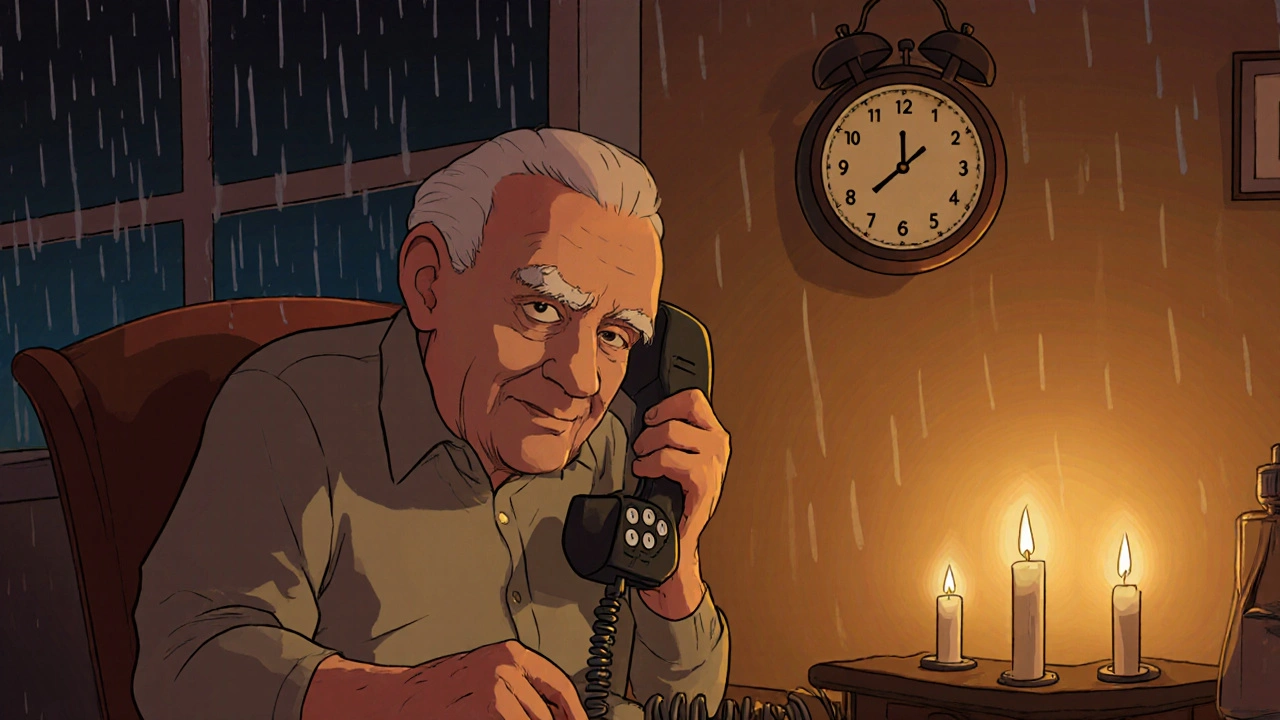

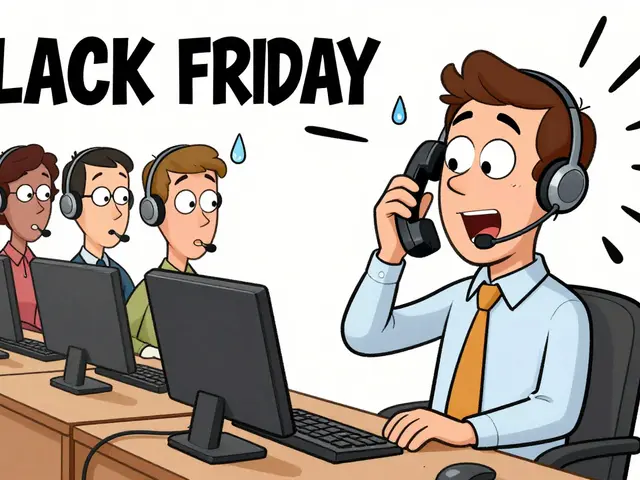

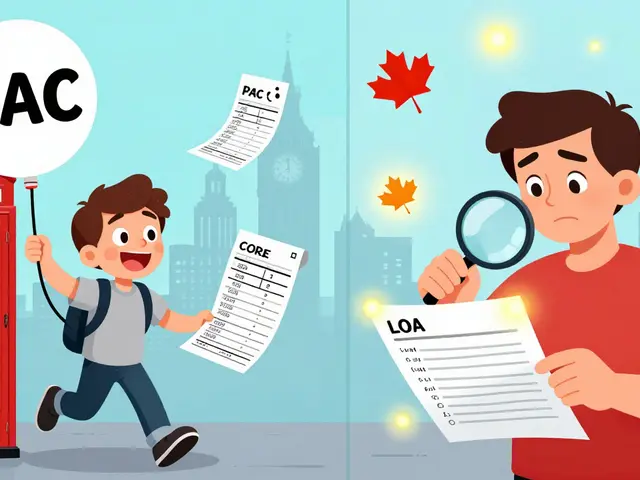
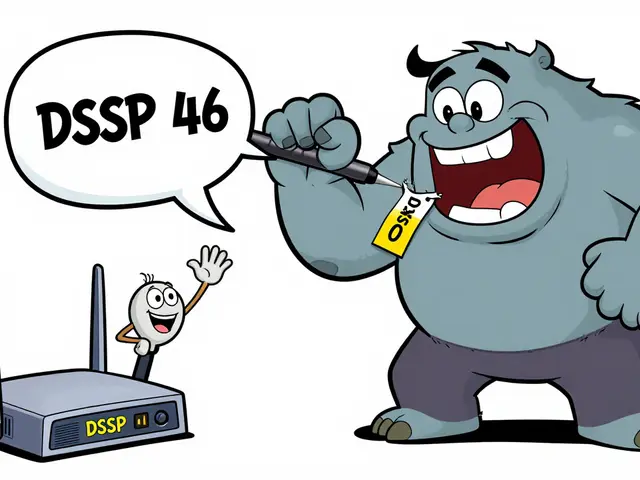
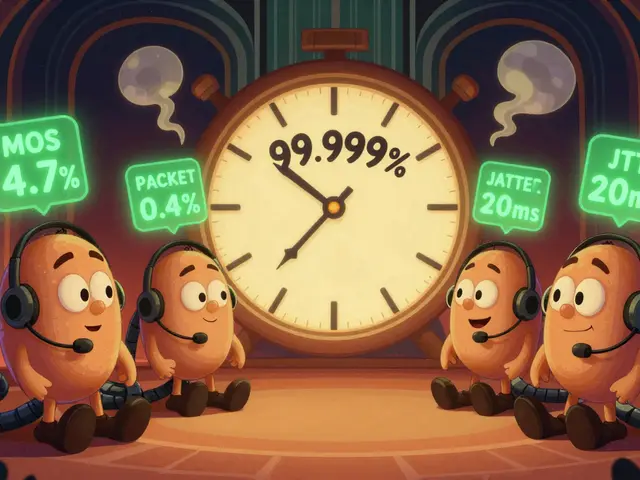
Jeremy Chick
31 Oct 2025 at 11:12Man, I just got off the phone with my grandma who swears by her landline. She doesn't even know what Wi-Fi is, but she knows that when the power goes out during a storm, her phone still rings. I tried to get her a VoIP thing with 'smart blocking'-she called it 'that fancy junk that talks back to me.' Now she just picks up and yells, 'WHO IS IT?' Like it's 1995. And honestly? I'm not mad. She's safe. That's all that matters.
Also, the fact that 911 knows exactly where she is? That’s not a feature. That’s a goddamn lifeline. No app. No GPS. No 'please confirm your location.' Just phone. Wall. Emergency. Done.